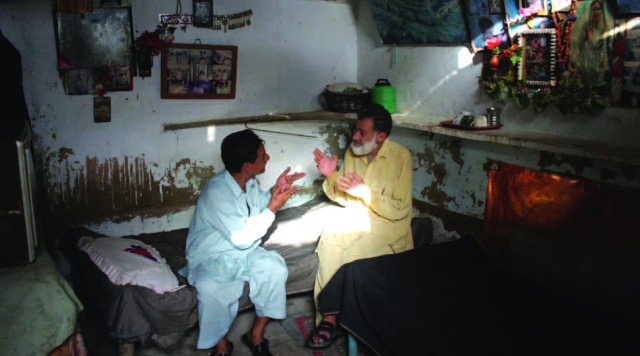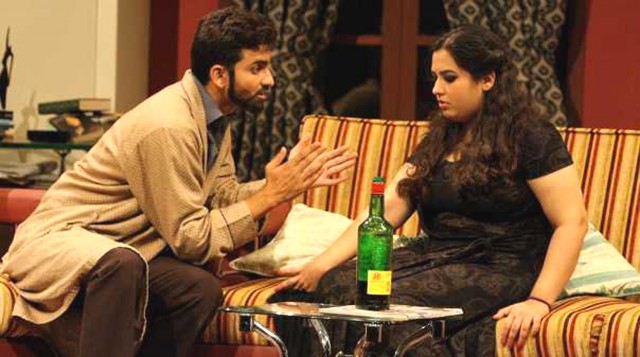Kamal Ahmed Rizvi: The versatile thespianKamal Ahmed Rizvi: The versatile thespian

Kamal Ahmed Rizvi is no alien to the world of performing arts in Pakistan. One of my mentors in Theatre Arts, Rahat Kazmi once rightfully said at a private meeting that if you have to point out one name among a list of thespians in Pakistan, who made quality theatre his livelihood and staged plays most consistently and regularly, it is no one but Kamal Ahmed Rizvi. I took Mr. Kazmi’s word and later found out to my surprise that Kamal, the passionate thespian, not only adapted a number of western plays to our cultural significance and social context but also staged them successfully over the course of five decades.
Kamal Ahmed Rizvi’s association to theatre goes back to the early fifties when he was an angry young man who had migrated to Lahore after the Partition. His association with the remarkable storyteller Saadat Hassan Manto brought him to limelight when he dramatized Badshahat ka Khatima, a short story of Manto, for stage. In a few years Kamal shot to fame in literary circles of Lahore through his radio and stage plays which were widely acclaimed by the public and critics alike.
Kamal made a nationwide impact with his impeccable wit and sarcasm in Alif Noon, in which he starred with Rafi Khawar on good ol’ PTV. The duo touched the hearts and minds of both the ordinary and those who claim to be not. Penned and directed by Kamal himself, Alif Noon made a household impact across the country as did many of his other plays on television and radio. But theatre remained his first love and still is.
However there’s one man whom Kamal is usually associated with in terms of satire and sarcasm. The man is none other than Saadat Hassan Manto. To find out more about what Kamal has to say about Manto, I went to see him one fine morning. Sitting in his drawing room that holed up a number of paintings and art works, I was taken by surprise because the frail look of his age does not match with the shine of his eyes when he speaks of Manto. Here is what the old but witty thespian has to share.
TNS: What was Manto like?
Kamal Ahmad Rizvi: Manto used to wear white Uchcan, very cleanly knitted. Never a spot of dirt I found on his clothes. He used to hire a horse cart everyday from morning till evening, to collect funds from his friends for his pint of alcohol for the night. I never saw him being greedy over it as the moment he had collected the money for the pint, he would ask the cart man to take the route back home. That was his lifestyle.
TNS: What is your association with Saadat Hassan Manto? How did it begin?
Kamal Ahmad Rizvi: I was very young when I had asked a friend from Radio Pakistan in early fifties, who happened to be from Amritsar, to help me meet Manto. I was told to bring a bottle of whiskey along as a present for Manto since that was only way to have his acquaintance. I saved up a sum of currency to buy a pint of local whiskey, caught up with my friend and went to meet him one day at a house located near Dayal Singh College in Lahore. We entered from backdoor of the house, because the front door had been looked from outside to make it look like an abandoned place. As I was introduced formally, Manto inquired about why I wanted to meet him. I was a nobody back then. I told him who wouldn’t like to see him in this age. He was casually looked me up, I continued: “It was a dream to meet you”, to talk to him in those days was an obsession for everyone who read literature.
TNS: What characteristics and traits did you regularly identify with his personality?
Kamal Ahmad Rizvi: Compassion and kindness . Once we were passing by the Mall Road when Manto identified a cane vendor, who had dressed up as a groom and was still selling the cane. Manto told me that the vendor would be getting married tonight. For a proof, he asked to notice his fancy clothes. I was surprized by his sheer conviction. Manto went up to the vendor, gave him all the money that he had, saying: “Go home and attend your wedding. I am buying it all today.”
On another occasion, Ibrahim Jalees and I accompanied him on the Mall Road where a shop’s opening ceremony was taking place. A large crowd had gathered around there when someone called out: Let it be inaugurated by Manto. He replied: “I don’t have whiskey today and you are taking of taking pictures, that’s not fair.” He was assured by the show owner that a bottle would soon be brought to the spot.
Later we moved on to our sitting area with Manto holding his wrapped present from the shop owner. But Manto got really surprized when he unwrapped the special present, and refused to drink when he found a Scotch whiskey from inside. We insisted that it was okay to have the best of whiskeys sometime in life. He told us this would make him cast a greedy man in the eyes of God.“Wo sochey ga key dekho main Manto ka roz intezaam karta hoon aur aaj Ingreezi dekhi, tu wo lalach kar gaya.” [God would think that Manto got greedy, even though I have managed to provide him his share of local whiskey from here and there everyday, as promised]. Manto only liked to have locally brewed alcohol all his life by the way.
TNS: It is sometimes argued that some of his short stories are loosely structured. Your comment?
Kamal Ahmad Rizvi: No, this is not right. I am not a judge or jury, but you can learn the art of writing stories from Manto any given day. His craft is flawless, his observation is knightly. His stories are eyeopener for society. At that time in modern storytelling we had Krishan Chander, Rajinder Singh Bedi, and later on, Ahmed Nadeem Qasmi. But Manto shadowed them all in his day and still does.
TNS: The Progressive Writers Movement never completely owned and recognized Manto in his life. Professor Hassan Askari also mentioned that his essays on Manto. Apparently, there were some lists issued in literary magazines which stated who belonged to the progressives and who didn’t. Why didn’t progressive writers and thinkers compliment his work with arms wide open as suggested by Professor Askari?
Kamal Ahmad Rizvi: Manto did not require that. He never did and never would. He was not interested. Period. He did wish to be told of his greatness. He simply did not care about the material aspects of his social life. Manto was aQalander in that respect. He was beyond acclaim or applause. He was indifferent to constructed literature and art for a purpose. His passion was to write stories, and stories alone.
TNS: Were there other reasons for some literary circles not liking him then?
Kamal Ahmad Rizvi: Manto had weaknesses too, like all of us. But his art of storytelling was flawless. Yes, I know that some circles did question the authenticity of some of his published stories, which very obviously were not his. The low standard of such stories was quickly identified and questioned. In fact, they were published when Manto did not have a penny to buy alcohol and had not written a story on a given date by the publisher. Thus he gave away a few stories which were left with him for correction by unknown writers. That resulted in a big hue and cry at a literary meeting.
To be honest I had also argued against one such short story published in his name. He got angry with me, but in the next few days when we met he agreed to my point of argument. However he also said: “Couldn’t they {his critics} take the story as his to have me pleased for a while, just to show some regard to a man who has given them {the Urdu literature} so many of original stories?”
TNS: Did Manto try to make an attempt, an effort to seek attention all of a sudden, to shock his readers intentionally in his stories?
Kamal Ahmad Rizvi: No, never. He did not try to do it intentionally. He just had it all so effortlessly. It is rubbish to say that he was seeking attention to say something new in a shocking manner. He just had it in him, a gifted observation coupled with a unique expression.
TNS: Do you believe he was ahead of his time?
Kamal Ahmad Rizvi: I don’t think so. He was right there in his time. Perfect time for him. He was in it, was very much a part of it. Like Dickens and Tolstoy, he held greatness. Like them he was the need of his time, which he exploited perfectly. Thus he turned into a legend. He is very much relevant for all times if you ask me.
TNS: Can we possibly say that he was the greatest storyteller of 20th century in Urdu?
Kamal Ahmad Rizvi: Possibly. But see, this is not the right way to put it. A great man remains great for all centuries and all seasons. Shakespeare’s greatness is for all times, as does Ghalib’s. Same goes for Manto.
Published in Encore, The News International, February, 2012.






